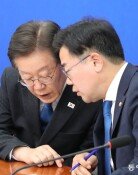[Editorial] Both the National Pension and Special Pensions Should Be Reformed
[Editorial] Both the National Pension and Special Pensions Should Be Reformed
Posted February. 16, 2006 02:59,
The Ministry of Health and Welfare said it would reform the national pension system within this year following a governmental plan according to which the insured should pay more and receive less. This has been already foretold since President Roh Moo-hyun emphasized the urgency of reforms in his New Year speech and appointed Rhyu Si-min as the Health and Welfare minister. Financial resources of the national pension system are expected to dry up by 2047. We should not leave the national pension as it is, thereby passing burdens on to our next generations.
However, this issue cannot be resolved by reforming the national pension alone. Under special pension schemes such as the government employees pension, the military personnel pension, and the teachers pension (for private school teachers), the insured pay less and receive more. These special pensions should also be reformed in a way that makes subscribers to these pensions pay more and receive less. Only by doing so can the government elicit the publics consensus for national pension reforms. A recent survey on national pension experts conducted by the Dong-A Ilbo backs this point.
The government said it is worried about the national pension funds depletion. However, the military personnel pension and the government employee pension have run deficits since 1973 and 1993 respectively. Tax money has filled in the gap. Last year alone, the government employee pension ran short of 609.6 billion won which was replenished from the National Treasury. The teachers pension system is also likely to need replenishment from the national treasury if it is to be depleted by 2026.
Another problem is how to achieve equity between the national pension and special pensions. While national pension subscribers will receive 2.2 times of what they pay starting at age 60 over their latter part of their lives, the government employment pension subscribers who retire this year will receive 3.5 to 7 times of their accumulated contributions starting the age of 52. The government employee pension is so generous that even staff members at the Government Employee Pension Corporation, who are not public officials, say that they want to subscribe to the pension.
Moreover, the governments plan is not likely to solve the issue of those who remain unsubscribed or who are failing to pay contributions: no less than one out of three people. The poor are in the blind spot of the national pension system. The aged poor are sure to fall on the shoulders of the people as burdens. The governments plan is nothing more than a makeshift that might delay the depletion of the fund for about 30 years at best.
Minister Rhyu should not try to push ahead with the governments plan, being too sensitive of what President Roh wants. It is not persuasive either that Minister Rhyu who defaulted in national pension contributions is now demanding the people should shoulder more burdens. The pension system should be discussed again in a larger framework, beyond the governments plan. Another way is to move toward a double-tier pension system by newly adopting a basic pension for only lower-income families and reducing the current national pension to pension in proportion to income.
Headline News
- Pyongyang’s trash provocation makes Seoul consider loudspeaker broadcasting
- Two Korean Americans win prizes at Queen Elisabeth Competition
- Tech firms including Google, Intel form anti-Nvidia frontline
- Biden suggests cease-fire plan to end war
- Kim Woo-min wins gold in men’s 400m freestyle in personal best time







